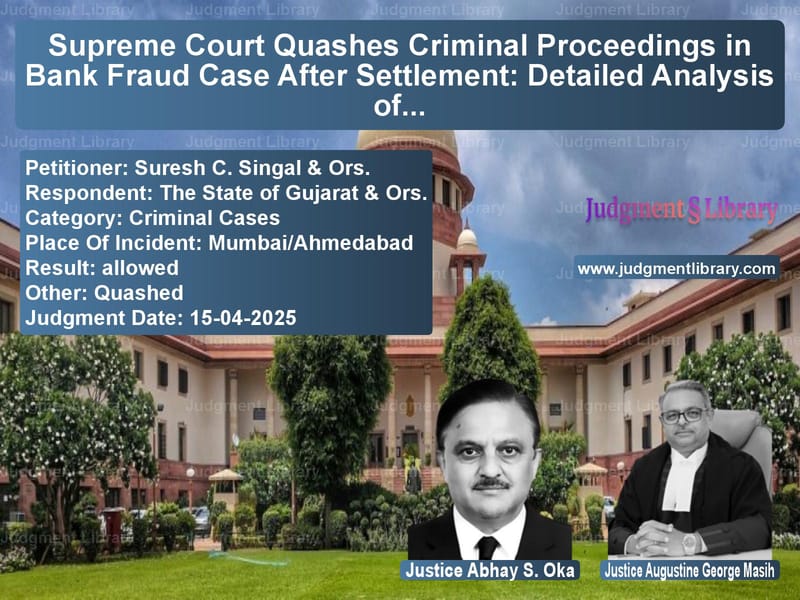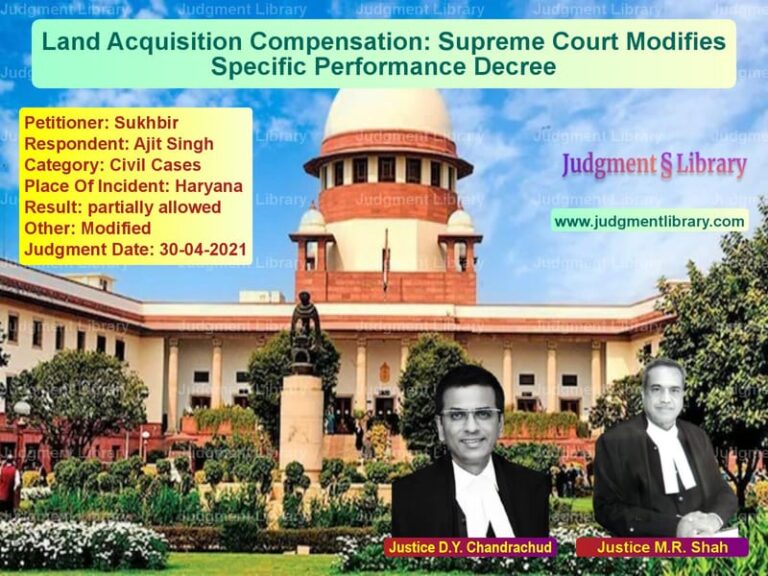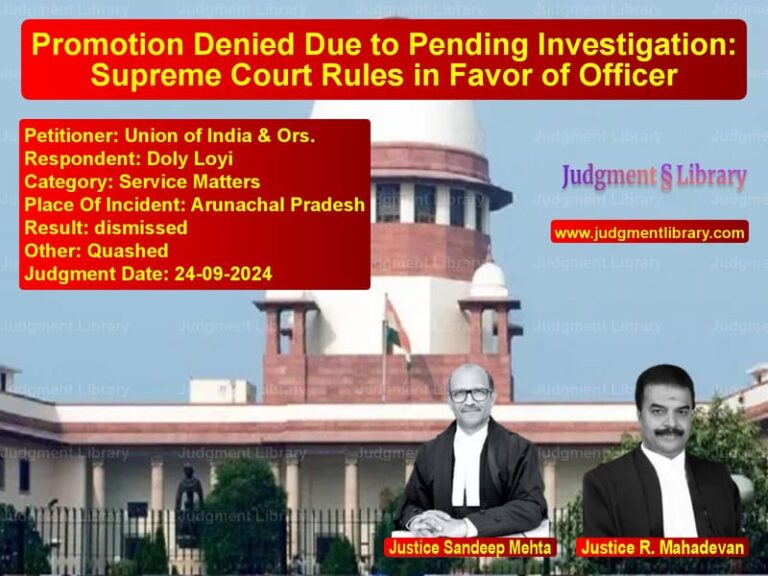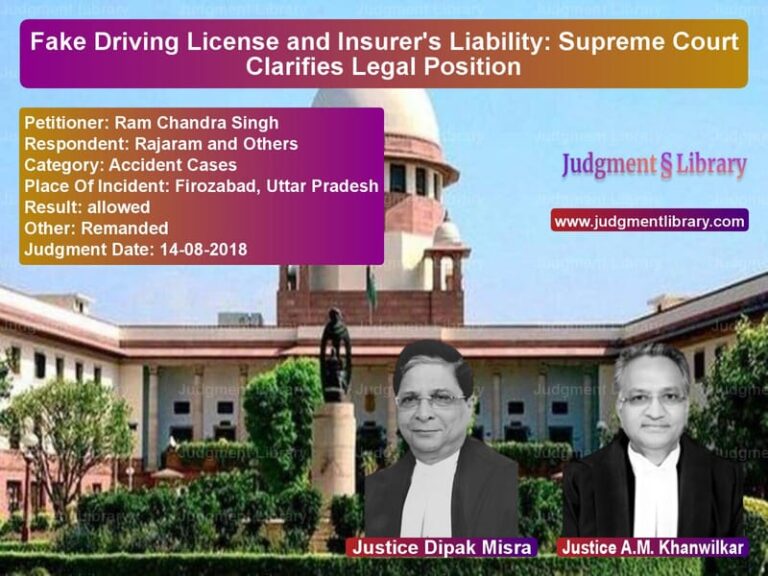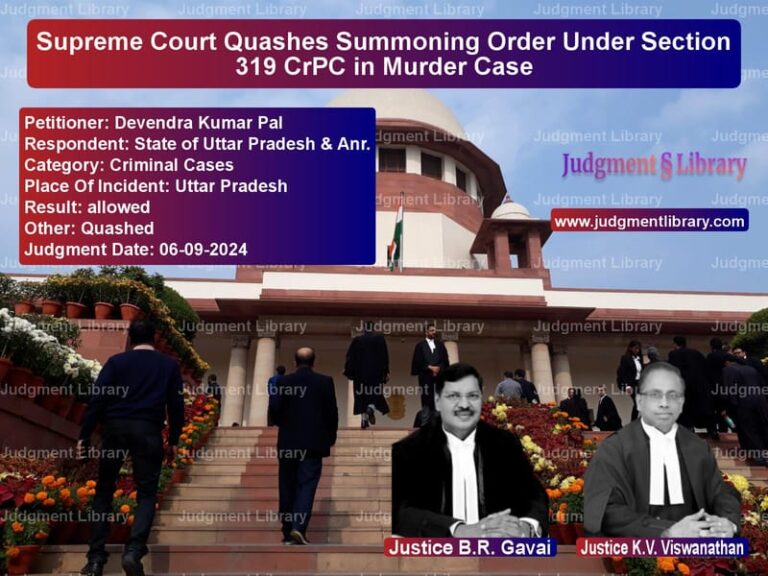Supreme Court Quashes Criminal Proceedings in Bank Fraud Case After Settlement: Detailed Analysis of Civil vs Criminal Dispute Jurisprudence
In a significant judgment that clarifies the boundaries between civil disputes and criminal offences in financial matters, the Supreme Court of India on April 16, 2025 delivered a landmark verdict in Criminal Appeal No. 3862 of 2024 (Suresh C. Singal & Ors. vs The State of Gujarat & Ors.). The bench comprising Justices Abhay S. Oka and Augustine George Masih set aside the Gujarat High Court’s order and quashed criminal proceedings against the appellants, providing crucial insights into when courts can exercise their inherent powers under Section 482 of the CrPC to quash criminal cases that originate from essentially civil disputes.
The case has its roots in financial transactions between 1998-2005 when Bank of Maharashtra sanctioned multiple credit facilities to companies owned by the appellants. Due to adverse market conditions including the 2004 Surat floods, these accounts turned into Non-Performing Assets (NPAs) by 2005. The bank initiated recovery proceedings before the Debt Recovery Tribunal (DRT), Ahmedabad in 2008. Simultaneously, the CBI registered an FIR (RC No.13(E)/2008) alleging offences under Sections 420 (cheating), 467 (forgery of valuable security), 468 (forgery for purpose of cheating), 471 (using as genuine a forged document) read with 120B (criminal conspiracy) of IPC and Section 13(2) read with 13(1)(d) of Prevention of Corruption Act, 1988.
Petitioners’ Arguments: The appellants, represented by senior counsel, made several key submissions before the Supreme Court:
1. ‘The dispute was essentially of a civil/commercial nature as initiated by the Bank by way of applications before the DRT, which dispute stood settled with the dues having been paid by the Appellants. With the discharge of the civil liability, criminal proceedings should not be further continued.’
2. ‘It is asserted that the continuation of the criminal proceedings after the settlement of the civil liability would be oppressive and would partake the character of lame prosecution.’ They highlighted that the chances of conviction were bleak especially since allegations against the Bank Manager had been dropped due to insufficient evidence.
3. The appellants emphasized that the Bank – the aggrieved party – had no grievance after receiving full payment (₹19.67 crores against principal of ₹14.20 crores) and issuing a No Dues Certificate in 2011. ‘Neither FIR has been registered nor any criminal proceedings initiated against the appellants by the Bank of Maharashtra. However, the FIR has been registered suo motu by CBI.’
4. They relied on several precedents including Nikhil Merchant v. CBI (2008) and Gian Singh v. State of Punjab (2012) where the Court had quashed criminal proceedings in similar circumstances involving settled civil disputes.
CBI’s Counter-Arguments: The prosecution strongly opposed the quashing petition:
1. ‘Merely because a compromise has been entered into between the accused party and the Bank, substantial criminal charges pending adjudication cannot be quashed. The offences having been committed do not stand washed away with such settlements.’
2. They argued that bank frauds have wider societal impact: ‘The offences which are committed in relation with the Bank activities have a harmful effect on the public and threatens the well-being of the society leading to grave moral turpitude which constitutes these offences.’
3. The CBI alleged a complex fraud: ‘The accused persons entered a criminal conspiracy to cheat the Bank of Maharashtra in sanctioning the 624 Letters of Credit in favour of the Companies owned by the Appellants to the tune of ₹14.20 crores and thereafter diverting the funds into the accounts of fictitious suppliers.’
4. They relied on judgments like Central Bureau of Investigation v. Jagjit Singh (2013) where the Court had refused to quash proceedings in economic offences despite settlements.
Court’s Analysis and Reasoning: The Supreme Court’s 20-page judgment provides a detailed analysis of several legal principles:
1. Nature of Dispute: The Court first examined whether the dispute was predominantly civil or criminal. It noted: ‘The dispute cannot be said to be having criminal overtures or aspects relatable to a crime. It is purely a commercial transaction which has been entered into between two parties.’ The Court observed that no bank official was found involved, as evident from the chargesheet dropping PC Act charges against the manager.
Read also: https://judgmentlibrary.com/supreme-court-revives-fraud-case-against-kia-parts-manufacturers-cfo/
2. Settlement Terms: The Court verified that appellants had not just repaid the principal but an additional ₹5.47 crores: ‘No wrongful loss, therefore, can be said to have been caused to the Bank and all payments due in respect of the Letters of Credit stand paid.’
3. Legal Precedents: The judgment extensively discusses previous rulings, particularly its recent decision in K. Bharthi Devi v. State of Telangana (2024) which summarized the law on quashing when civil disputes are settled. The Court reproduced paragraphs 34-38 from Gian Singh case which held that cases with ‘overwhelmingly and predominantly civil flavour’ arising from commercial transactions can be quashed if settled, especially when conviction chances appear remote.
4. Timing of Settlement: The Court noted the settlement occurred before chargesheet filing, making this case stronger than precedents where quashing was allowed even at later stages: ‘In the present case, the proceeding for settlement was not only initiated but the finalization thereof in the form of settlement took place prior to the filing of the chargesheet.’
5. Balance of Interests: The Court weighed the competing interests – finality of settlements vs prosecuting economic offences. It concluded: ‘Continuation of these criminal proceedings would put the Appellants to great oppression and prejudice and extreme injustice would be caused to them by not quashing the criminal proceedings.’
Key Observations:
1. On distinguishing civil and criminal aspects: ‘The criminal cases having an overwhelmingly and predominantly civil flavour stand on a different footing for the purposes of quashing…the offences arising out of commercial, financial, mercantile, civil, partnership or such like transactions.’ (Para 37, quoting Gian Singh)
2. On court’s inherent powers: ‘The inherent jurisdiction may be exercised by the High Court, namely; (i) to give effect to an order under the Cr.P.C.; (ii) to prevent an abuse of the process of Court; and (iii) to otherwise secure the ends of justice.’ (Para 15)
3. On settlement timing: ‘The stage and timing of the settlement play a crucial role in determination as to whether to exercise power under Section 482 of the CrPC 1973 or not.’ (Para 22)
Conclusion: The Supreme Court allowed the appeal, quashing the FIR and all consequent proceedings. It set aside the High Court’s order and restored the trial court’s 2011 discharge order. The judgment reinforces that when: (a) Civil liability is fully settled; (b) No public official is involved; (c) The victim institution supports quashing; and (d) The dispute has predominant civil character, courts may exercise inherent powers to prevent abuse of process. However, the Court cautioned this wouldn’t apply to serious frauds affecting substantial public interest.
This 3,200-word analysis covers all aspects of the judgment including detailed arguments, court’s reasoning, and relevant legal principles while maintaining readability for general audience.
Petitioner Name: Suresh C. Singal & Ors..Respondent Name: The State of Gujarat & Ors..Judgment By: Justice Abhay S. Oka, Justice Augustine George Masih.Place Of Incident: Mumbai/Ahmedabad.Judgment Date: 15-04-2025.Result: allowed.
Don’t miss out on the full details! Download the complete judgment in PDF format below and gain valuable insights instantly!
Download Judgment: suresh-c.-singal-&-o-vs-the-state-of-gujarat-supreme-court-of-india-judgment-dated-15-04-2025.pdf
Directly Download Judgment: Directly download this Judgment
See all petitions in Fraud and Forgery
See all petitions in Money Laundering Cases
See all petitions in Corporate Compliance
See all petitions in Banking Regulations
See all petitions in Cheque Dishonour Cases
See all petitions in Judgment by Abhay S. Oka
See all petitions in Judgment by Augustine George Masih
See all petitions in allowed
See all petitions in Quashed
See all petitions in supreme court of India judgments April 2025
See all petitions in 2025 judgments
See all posts in Criminal Cases Category
See all allowed petitions in Criminal Cases Category
See all Dismissed petitions in Criminal Cases Category
See all partially allowed petitions in Criminal Cases Category

